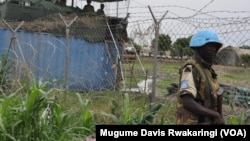A spokesman for South Sudanese President Salva Kiir on Thursday dismissed complaints from U.N. peacekeeping chief Herve Ladsous that the government of South Sudan is barring the U.N. from using military equipment, including aerial drones, to protect South Sudanese civilians.
“There is no Al-Qaida in South Sudan. There is no terrorist… Why do they want to bring drones to South Sudan?” presidential spokesman Ateny Wek Ateny told South Sudan in Focus by phone.
Ladsous told the Security Council Wednesday that the government of South Sudan, and President Kiir personally, have repeatedly denied U.N. requests to deploy drones and attack helicopters to help better protect civilians displaced by 18 months of fighting in the country.
Photo restrictions
Ladsous also said that the South Sudanese authorities have found “new ways to harass and intimidate” U.N. personnel in South Sudan, including the recent expulsion of U.N. Humanitarian Coordinator Toby Lanzer and then declaring this week that U.N. workers caught taking photos in the country will be considered spies.
Ateny said the restrictions on photography applied only to South Sudanese military installations and soldiers.
“We can’t allow our military installations to be photo'ed. This is a universally practiced norm that military installations should not be photo’ed or even come close to,” Ateny said.
Ateny said that U.N. staff who violate the restrictions on photographing military personnel or facilities would be considered to have overstepped the U.N. mandate in South Sudan.
The U.N. invoked Chapter 7 of the U.N. Charter when it set up the U.N. Mission in South Sudan (UNMISS) on July 9, 2011 - the day the new nation was born. Chapter 7 allows member states to use all possible means -- including economic sanctions and military action -- to enforce a U.N. resolution.
The original UNMISS mandate supported South Sudan government efforts to consolidate peace in the country and help with nation-building. But when violence broke out in December 2013, the focus of the U.N. Mission in South Sudan was shifted to protecting civilians, facilitating humanitarian assistance, monitoring and reporting on human rights, preventing further inter-communal violence, and supporting the peace process.







